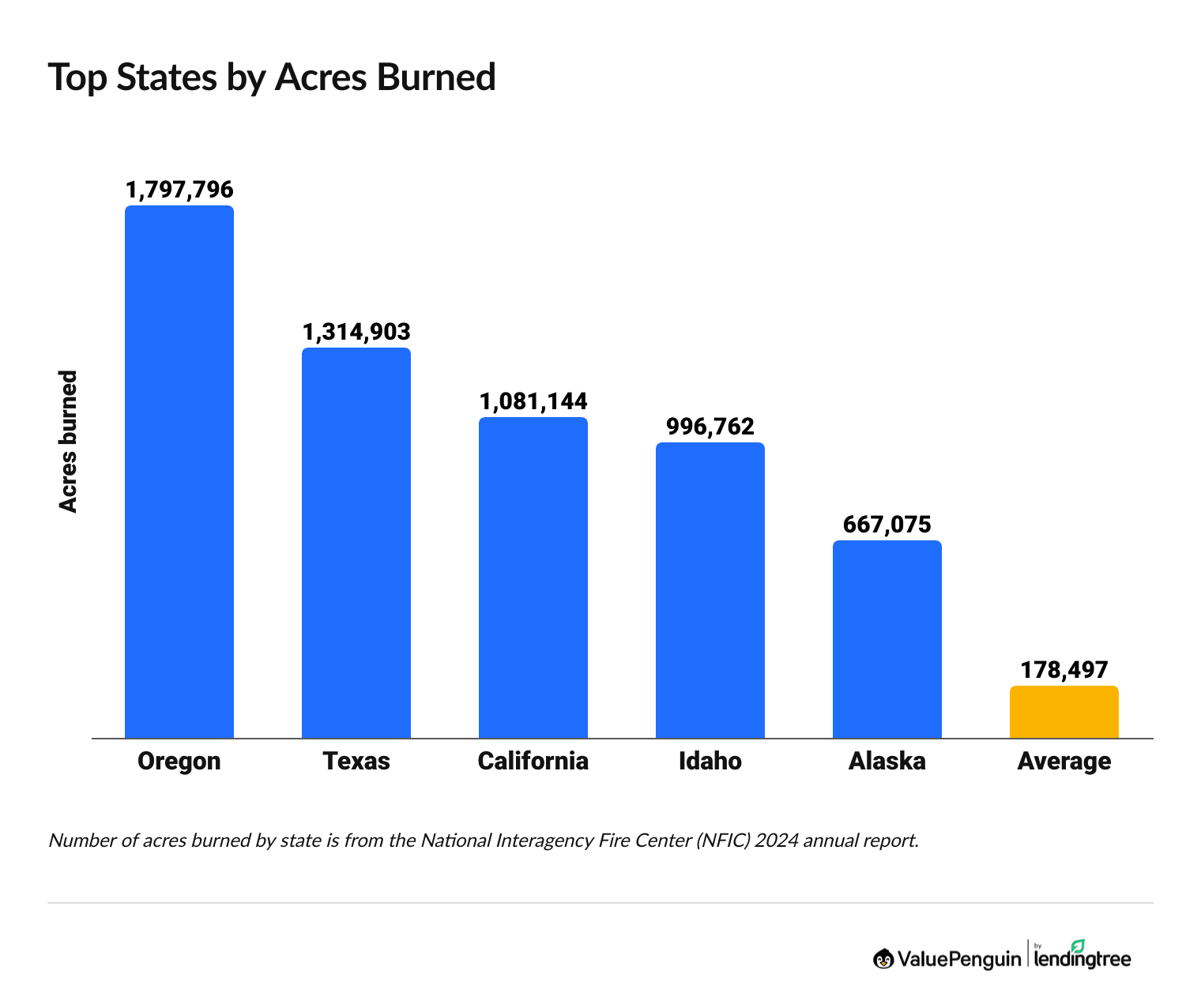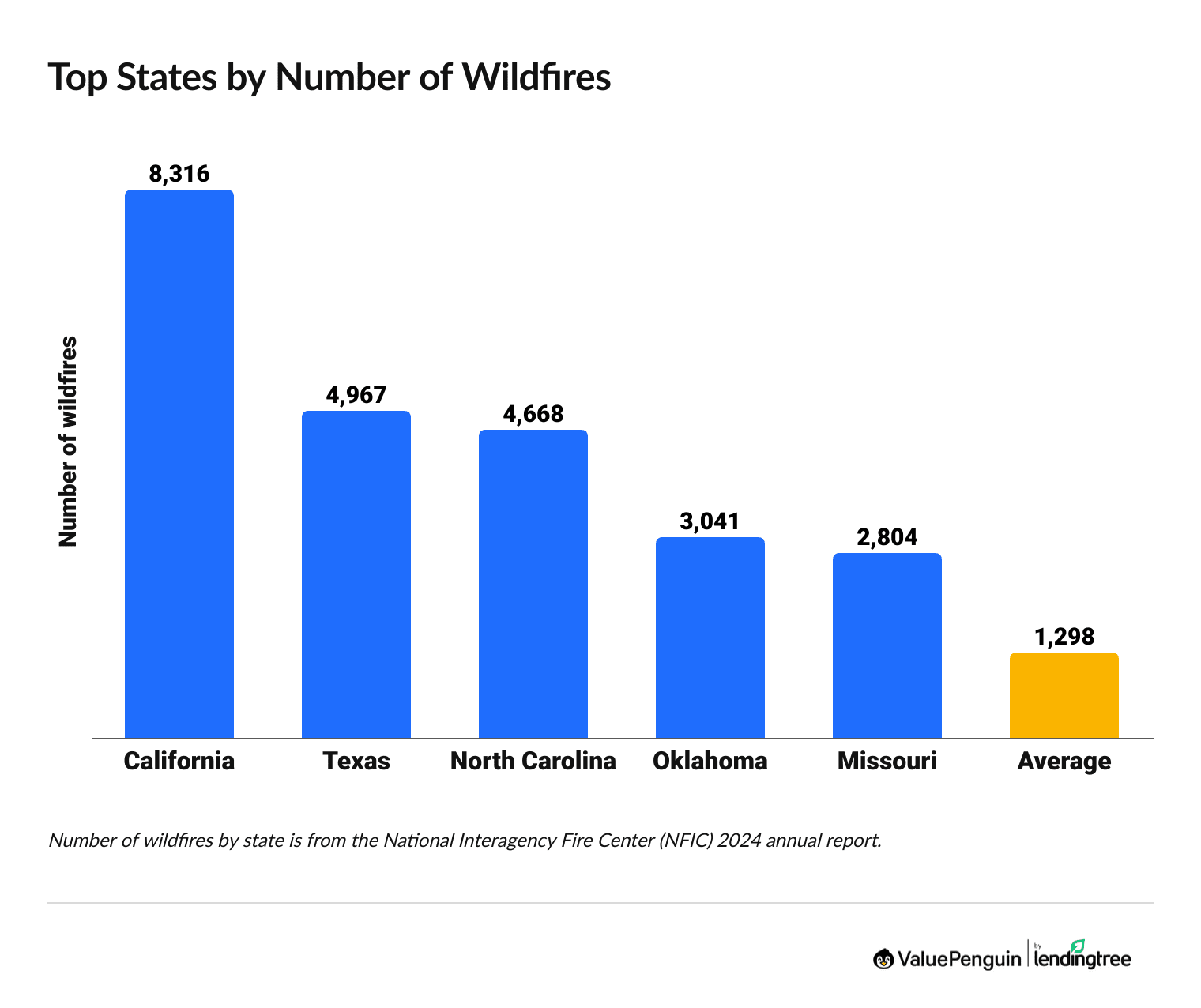Wildfire Statistics: Damage, Fatalities and Insurance Rates
In the last five years, over 300,000 wildfires have killed 178 people in the United States.
Since the 1980s, the country has had 72,226 total fires per year, on average. Together, these wildfires have damaged 213 million acres of land and have cost the government over $2 trillion to fight.
Both the number of fires per year and the cost to fight wildfires have been increasing since the government started tracking figures in 1983.
Facts about wildfires
What state has the most wildfires?
Oregon had the greatest number of acres damaged by wildfires in 2024, while California had the highest number of fires.
States with the most acres burned
States with the most wildfires
States with the most acres burned
States with the most wildfires
Wildfire trends
Over the past five years, the number of wildfires per year has increased by 10%.
However, the total number of acres burned has decreased by 13% over the same period.
The number of wildfires increased by 17% between 2021 and 2022, which was mostly due to widespread droughts caused by La Nina.
In 2023, fewer fires ignited by lightning resulted in an 18% decrease in total fires and a 65% decrease in acres burned.
Trends in acres burned
Trends in number of wildfires
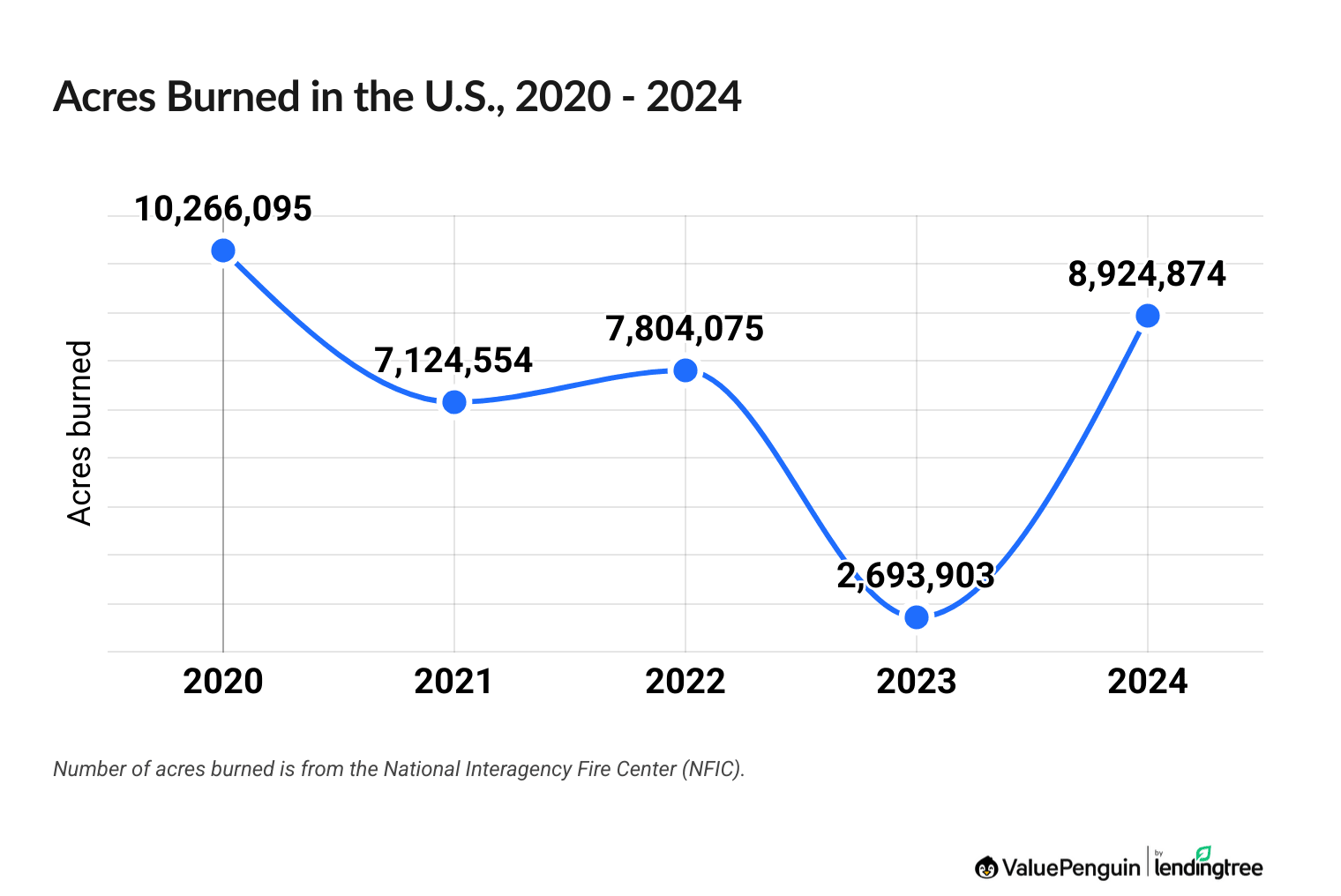
Acres burned by state, 2020 - 2024
Rank | State | Total acres |
|---|---|---|
| 1 | California | 8M |
| 2 | Alaska | 4.5M |
| 3 | Oregon | 4.4M |
| 4 | Texas | 2.6M |
| 5 | Idaho | 2.3M |
Trends in acres burned

Acres burned by state, 2020 - 2024
Rank | State | Total acres |
|---|---|---|
| 1 | California | 8M |
| 2 | Alaska | 4.5M |
| 3 | Oregon | 4.4M |
| 4 | Texas | 2.6M |
| 5 | Idaho | 2.3M |
Trends in number of wildfires
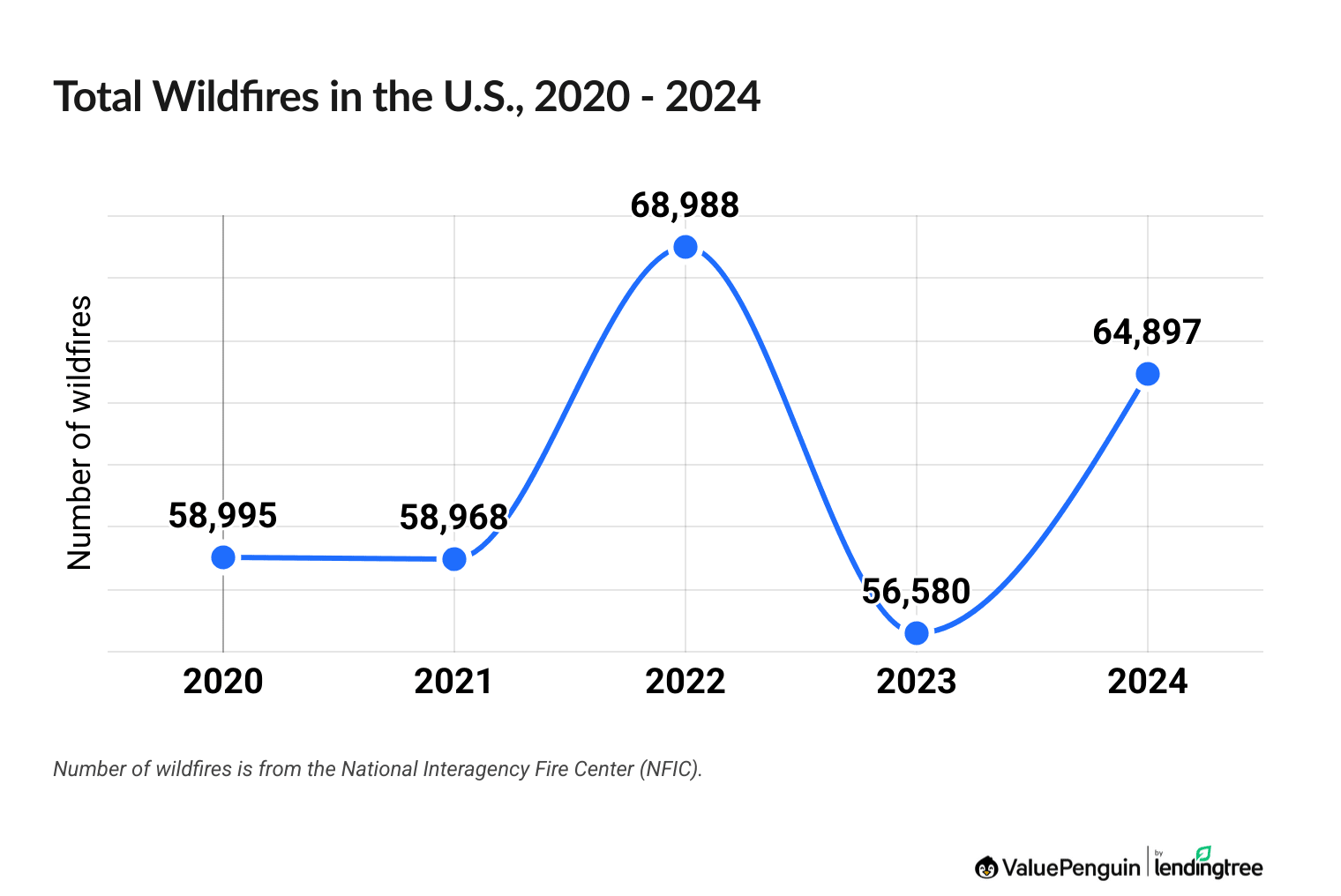
Wildfires by state, 2020 - 2024
Rank | State | Total fires |
|---|---|---|
| 1 | California | 43.3K |
| 2 | Texas | 3.1K |
| 3 | North Carolina | 7.8K |
| 4 | Georgia | 4.3K |
| 5 | Montana | 6.1K |
What causes wildfires?
Between 80% and 91% of wildfires are caused by people.
This includes fires started by campfires, fireworks, downed power lines and burning debris. The remaining 9% to 20% of wildfires are caused by lightning.
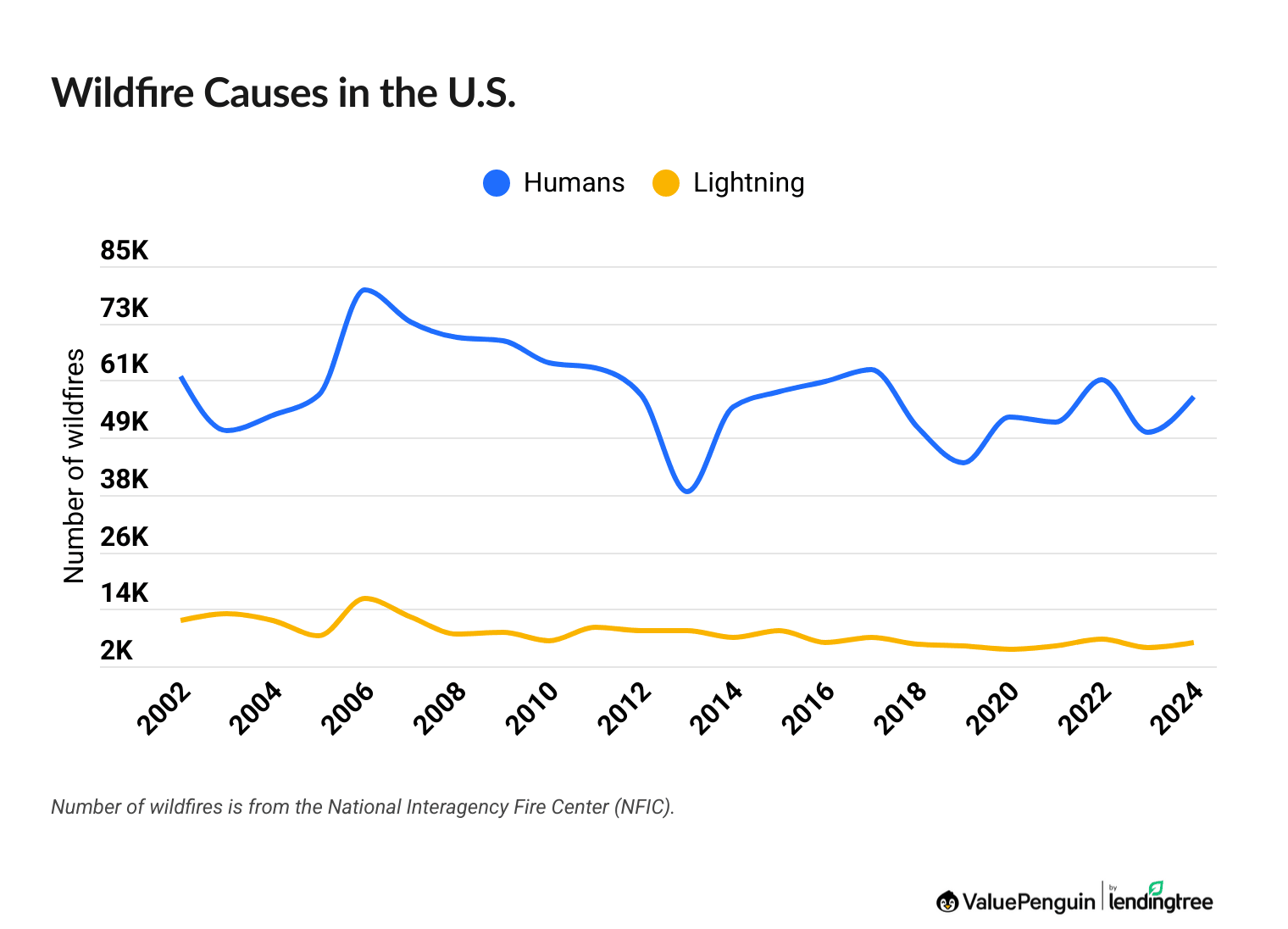
However, both causes can be equally destructive.
What percentage of wildfires are caused by humans?
Wildfires caused by humans
Acres damaged by human-caused wildfires
Year | Fires caused by humans | % of total fires |
|---|---|---|
| 2024 | 57,962 | 89% |
| 2023 | 50,697 | 90% |
| 2022 | 61,429 | 89% |
| 2021 | 52,641 | 89% |
| 2020 | 53,563 | 91% |
Wildfires caused by humans
Year | Fires caused by humans | % of total fires |
|---|---|---|
| 2024 | 57,962 | 89% |
| 2023 | 50,697 | 90% |
| 2022 | 61,429 | 89% |
| 2021 | 52,641 | 89% |
| 2020 | 53,563 | 91% |
Acres damaged by human-caused wildfires
Year | Acres damaged by human-caused fires | % of total fires |
|---|---|---|
| 2024 | 4,666,553 | 52% |
| 2023 | 1,533,245 | 57% |
| 2022 | 3,370,169 | 44% |
| 2021 | 3,023,759 | 42% |
| 2020 | 8,323,563 | 82% |
Average cost of wildfires
The Department of the Interior and the U.S. Forest Service have spent $2.1 trillion fighting wildfires since 1985.
That amounts to a total of $57 billion per year, or $19,925 per fire.
The cost of fighting wildfires has increased substantially since 1985. The government spent $2,905 per wildfire in 1985. In 2023, it cost around 19 times as much to put out a single fire, at $55,961.
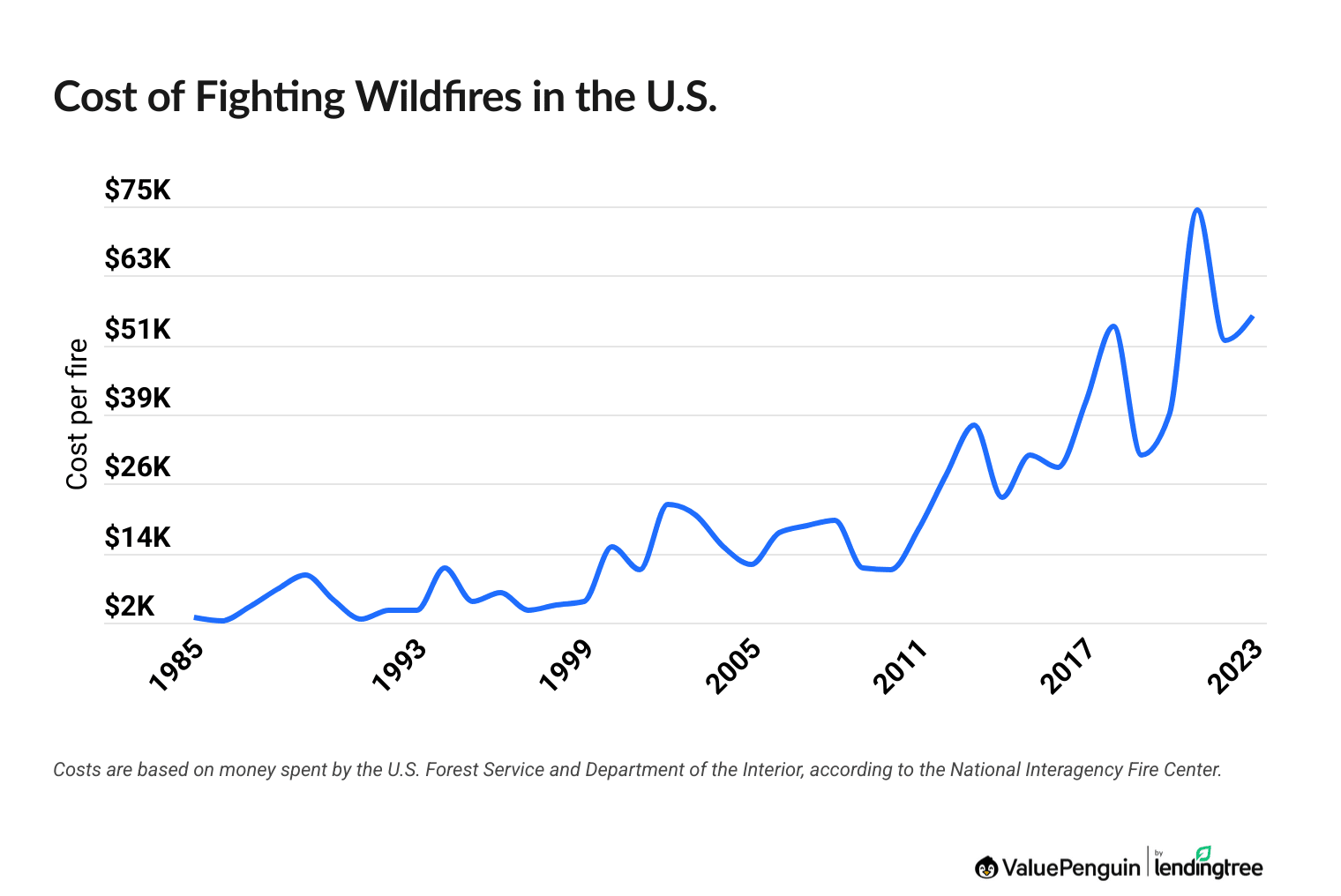
But 2023 wasn't the most expensive year for wildfires. In 2016, authorities spent $19.8 billion fighting wildfires, at a cost of $29,226 per fire.
Cost of fighting wildfires
Year | Cost per fire | Total |
|---|---|---|
| 2023 | $55,961 | $3.2B |
| 2022 | $51,444 | $3.6B |
| 2021 | $74,409 | $4.4B |
| 2020 | $38,575 | $2.3B |
| 2019 | $31,499 | $1.6B |
Total costs are based on money spent by the U.S. Forest Service and Department of the Interior.
Homes at risk of wildfire damage
There are over 2.6 million homes with at least moderate risk of wildfire damage in the U.S. Nearly half of them — around 1.2 million — have a very high risk of being destroyed by wildfires
California has the greatest number of homes at risk of wildfire damage.
Over 1.6 million California homes have a moderate or greater risk of wildfire damage. It's estimated that these homes would cost over $769 billion to rebuild.
10 states with the highest wildfire risk to homes
State |
Number of homes
| Cost to rebuild |
|---|---|---|
| California | 1.6M | $769.4B |
| Colorado | 321K | $140.9B |
| Texas | 245K | $88.4B |
| Oregon | 130K | $45.3B |
| Arizona | 125K | $36.2B |
Of the 15 U.S. cities with the greatest number of homes at risk of wildfire damage, 10 are in California. Around 15% of California's at-risk homes are located in Los Angeles.
Cities with the greatest wildfire risk to homes
State |
Number of homes
| Cost to rebuild |
|---|---|---|
| Los Angeles, CA | 246K | $186.6B |
| Riverside, CA | 211K | $112.8B |
| San Diego, CA | 139K | $87.9B |
| Sacramento, CA | 101K | $61.1B |
| Austin, TX | 95K | $40.6B |
How do wildfires affect home insurance?
Homeowners insurance covers fire damage. But people who live in areas with a high risk of wildfires may pay higher rates than typical homeowners.
In addition, insurance rates go up by an average of 24% if your home and belongings are totally destroyed by a wildfire and you file a claim.
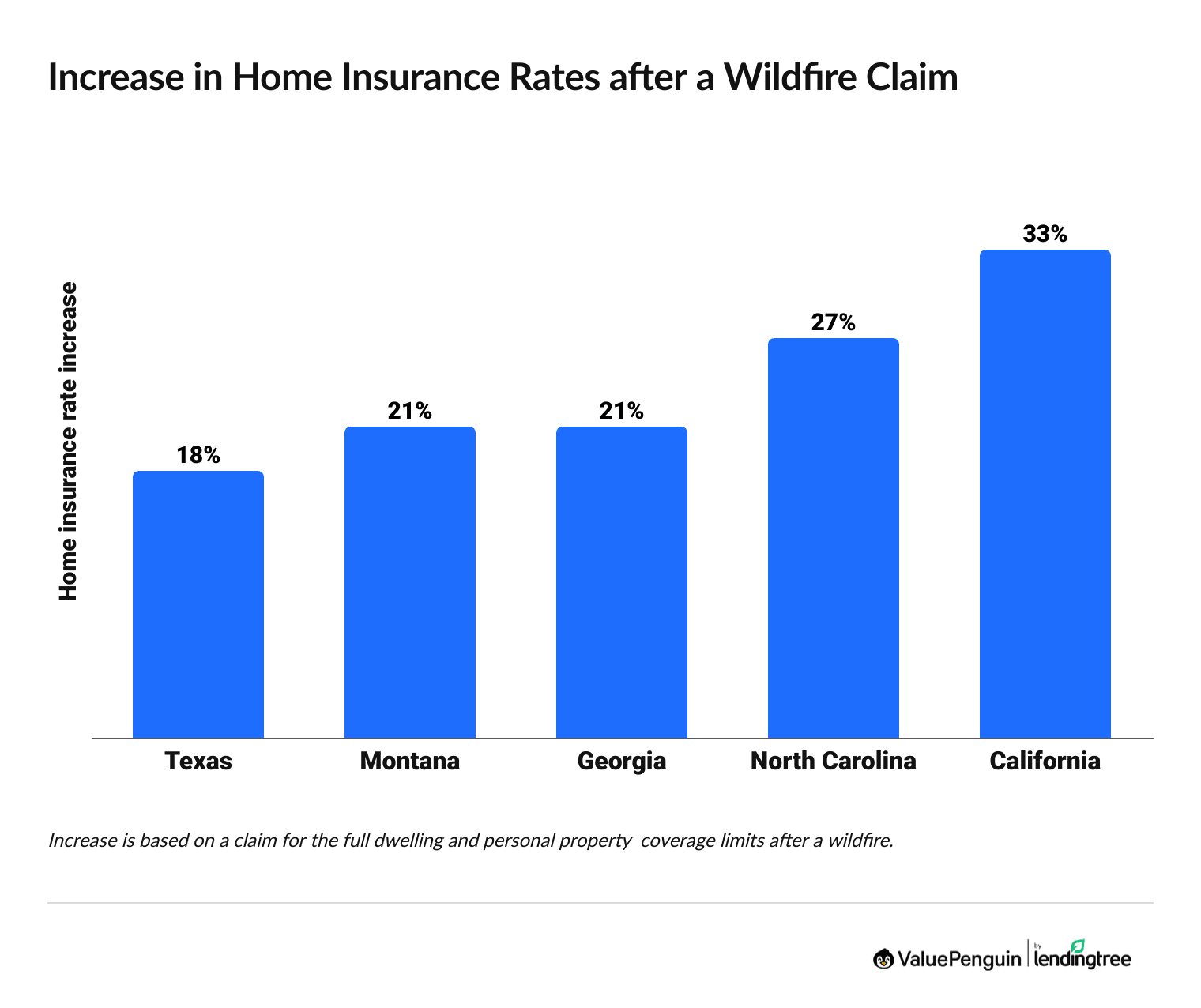
Find Cheap Homeowners Insurance Quotes in Your Area
Homeowners in California face a 33% rate increase after a wildfire. That's the largest increase of the five states with the greatest number of wildfires per year.
People who live in regions with a lot of wildfires may have trouble getting cheap homeowners insurance coverage, or getting covered at all.
If companies don't sell insurance in a particular area due to its history of wildfires, homeowners may be able to get high-risk home insurance coverage. These plans may also be called Fair Access to Insurance Requirements (FAIR) plans. They're partially paid for by taxpayers and are available only to people who can't get coverage elsewhere.
Wildfire property damage by state
Wildfires caused $9.9 billion in property damage between 2020 and 2024.
In Hawaii, wildfires caused more than $5.6 billion of property damage during that time. The majority of the damage occurred during the 2023 Lahaina wildfires.
Colorado has the second-most wildfire damage during this five-year period, at $2.3 billion. Twenty other states had over $1 million of property damage due to wildfires over this time.
Cost of wildfire property damage
State | Property damage |
|---|---|
| Hawaii | $5.6B |
| Colorado | $2.3B |
| Washington | $1.1B |
| California | $259M |
| New Mexico | $198M |
Table shows states that reported property damage due to wildfires between 2020-2024, according to the National Centers for Environmental Information (NCEI)
Wildfire deaths
Wildfires in the U.S. killed 178 and injured 355 people between 2020 and 2024.
Hawaii has the greatest number of wildfire deaths over the past five years. All 101 of Hawaii's wildfire deaths were caused by the 2023 Lahaina wildfires.
Compared to the total number of wildfires that take place every year and the number of acres that burn, relatively few people lose their lives. Just four states — Hawaii, California, Oregon and Colorado — had five or more deaths from wildfires during this time period.
Deaths and injuries from wildfires
State | Deaths | Injuries |
|---|---|---|
| Hawaii | 101 | 32 |
| California | 39 | 217 |
| Oregon | 10 | 1 |
| Colorado | 7 | 7 |
| New Mexico | 4 | 17 |
Table shows states that reported deaths or injuries due to wildfires between 2020-2024, according to the National Centers for Environmental Information.
California had the highest number of wildfire injuries, at 217. Injuries were spread between many different fires, but the most dangerous was the 2020 San Diego County fire, which injured 68 people.
Worst wildfires in U.S. history
Most of the worst wildfires in U.S. history occurred more than a century ago. The most destructive fires took place in 1898 and 1910, while the most deadly fire occurred in 1871.
Most destructive wildfires in U.S. history
The Great Fires of 1898 and 1910 were the two most destructive wildfires in U.S. history, leaving 3 million acres of burned land in their paths.
In more recent history, Alaska's 2004 Taylor Highway Complex fires burned 1.3 million acres of land. The fires were caused by lightning and didn't affect any of Alaska's major cities, but threatened woodland areas and many small towns.
Year | State | Name | Acres burned |
|---|---|---|---|
| 1910 | Idaho & Montana | Great Fire of 1910 | 3M |
| 1898 | South Carolina & North Carolina | Great Fire of 1898 | 3M |
| 2004 | Alaska | Taylor Highway Complex | 1.3M |
| 1940 | Alaska | Ruby Fire | 1.24M |
| 1871 | Wisconsin | Peshtigo | 1.2M |
Data is from the National Fire Protection Association.
Deadliest fires in U.S. history
The 1871 Peshtigo fire was the deadliest wildfire in U.S. history, with 1,152 fatalities.
The fire destroyed between 1.2 million and 1.5 million acres and 17 towns. The city of Peshtigo, Wisconsin was burned to the ground in just an hour, and the fire left $169 million of damage in its wake.
Top 10 deadliest fires in U.S. history
Year | State | Name | Deaths |
|---|---|---|---|
| 1871 | Wisconsin | Peshtigo | 1,152 |
| 1918 | Minnesota & Wisconsin | Cloquet & Moose Lake Fires | 453 |
| 1894 | Minnesota | Great Hinckley Fire | 418 |
| 1881 | Michigan | Thumb Fire | 282 |
| 2023 | Hawaii | Lahaina | 101 |
Data is from the National Fire Protection Association.
Worst fires in California history
The 2020 August Complex Fire was the largest wildfire in California history, while the 2018 Camp Fire was the deadliest.
These fires took place in adjacent counties in Northern California — the Camp Fire started in Butte, while the August Complex Fire affected Mendocino, Humboldt, Trinity, Tehama, Glenn, Lake and Colusa counties.
Most destructive fires in CA history
The 2020 August Complex Fire was started by a lightning strike in Northern California. It destroyed 1.03 million acres of land and over 900 buildings, and caused one death. The fire affected multiple cities, including Redding, Chico and Yuba City.
Year | Name | County | Acres burned |
|---|---|---|---|
| 2020 | August Complex | Mendocino, Humboldt, Trinity, Tehama, Glenn, Lake, & Colusa | 1.03M |
| 2021 | Dixie | Butte, Plumas, Lassen, Shasta & Tehama | 963K |
| 2018 | Mendocino Complex | Colusa, Lake, Mendocino & Glenn | 459K |
| 2024 | Park Fire | Butte, Plumas, Shasta & Tehama | 230K |
| 2020 | SCU Lightning Complex | Stanislaus, Santa Clara, Alameda, Contra Costa, & San Joaquin | 397K |
Data is from the California Department of Forestry and Fire Protection.
Deadliest California wildfires
The 2018 Camp Fire was started by a live power line that struck a transmission tower. The fire killed 85 people, burned over 153,000 acres and destroyed nearly 19,000 buildings. It started in the city of Pulga, but spread to Paradise, where it did most of its damage.
Year | Name | County | Deaths |
|---|---|---|---|
| 2018 | Camp | Butte | 85 |
| 1933 | Griffith Park | Los Angeles | 29 |
| 1991 | Tunnel | Alameda | 25 |
| 2025 | Eaton * | Los Angeles | 17 |
| 2020 | North Complex | Butte, Plumas, & Yuba | 15 |
*These fires are still under investigation. Numbers are subject to change.
In January 2025, the Eaton and Palisades fires resulted in at least 29 deaths, combined. The fires destroyed more than 37,000 acres and 16,000 buildings. Together, these are the worst fires in Los Angeles history.
Frequently asked questions
What has been the biggest fire in California history?
The 2020 August Complex Fire was the most destructive wildfire in California history. The fire, caused by lightning, burned 1.03 million acres across seven Northern California counties. It also destroyed over 900 buildings and killed one person.
What causes wildfires?
Humans cause between 80% and 91% of all wildfires in the U.S. There are a number of ways humans cause wildfires, including poorly controlled campfires, fireworks, burning debris and power lines. Of the remaining wildfires, most are caused by lightning.
What was the biggest wildfire in U.S. history?
The Great Fires of 1898 and 1910 are the largest wildfires in U.S. history. The Great Fire of 1898 burned three million acres across North and South Carolina, while the 1910 fire burned the same amount of land in Idaho and Montana.
Methodology
To find the average increase in homeowners insurance rates after a wildfire claim, ValuePenguin gathered quotes across the 5 states with the greatest number of wildfires over the past five years. Rates are for a home insured for the state's median home value and constructed in the state's median build year. The claim made for fire damage was for the full amount of dwelling coverage and personal property coverage, combined.
ValuePenguin's analysis used insurance rate data from Quadrant Information Services. These rates were publicly sourced from insurer filings and should be used for comparative purposes only. Your own quotes may be different.
Sources
- Wildfire data by state is from the National Interagency Coordination Center Wildland Fire Summary and Statistics Annual Reports
- Wildfire trends are from the National Interagency Coordination Center
- Human- and lightning-caused wildfire data is from the National Interagency Fire Center
- Cost of fighting wildfires is from the National Interagency Fire Center
- Homes at risk of wildfire damage data is from CoreLogic
- Wildfire property damage and fatality data is from the National Centers for Environmental Information (NOAA) Storm Database
- Worst wildfires in U.S. history are from the National Fire Protection Association
- Worst California wildfires are from the California Department of Forestry and Fire Protection
Editorial Note: The content of this article is based on the author's opinions and recommendations alone. It has not been previewed, commissioned or otherwise endorsed by any of our network partners.

